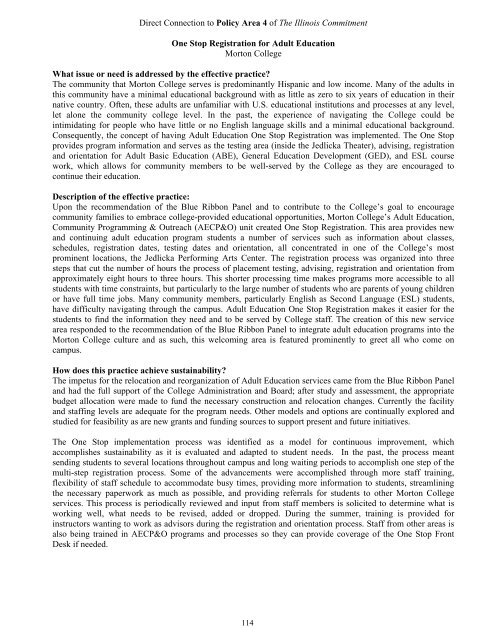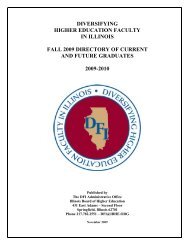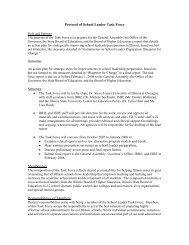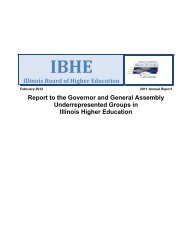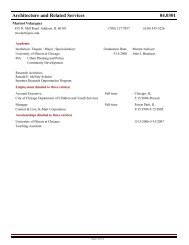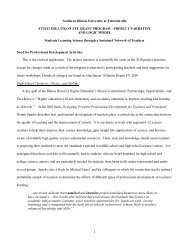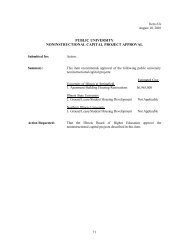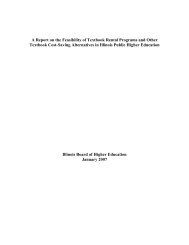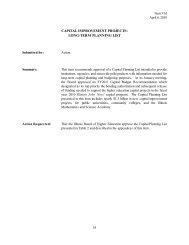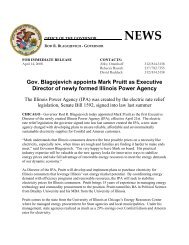Title of Effective Practice: - California Postsecondary Education ...
Title of Effective Practice: - California Postsecondary Education ...
Title of Effective Practice: - California Postsecondary Education ...
Create successful ePaper yourself
Turn your PDF publications into a flip-book with our unique Google optimized e-Paper software.
Direct Connection to Policy Area 4 <strong>of</strong> The Illinois Commitment<br />
One Stop Registration for Adult <strong>Education</strong><br />
Morton College<br />
What issue or need is addressed by the effective practice?<br />
The community that Morton College serves is predominantly Hispanic and low income. Many <strong>of</strong> the adults in<br />
this community have a minimal educational background with as little as zero to six years <strong>of</strong> education in their<br />
native country. Often, these adults are unfamiliar with U.S. educational institutions and processes at any level,<br />
let alone the community college level. In the past, the experience <strong>of</strong> navigating the College could be<br />
intimidating for people who have little or no English language skills and a minimal educational background.<br />
Consequently, the concept <strong>of</strong> having Adult <strong>Education</strong> One Stop Registration was implemented. The One Stop<br />
provides program information and serves as the testing area (inside the Jedlicka Theater), advising, registration<br />
and orientation for Adult Basic <strong>Education</strong> (ABE), General <strong>Education</strong> Development (GED), and ESL course<br />
work, which allows for community members to be well-served by the College as they are encouraged to<br />
continue their education.<br />
Description <strong>of</strong> the effective practice:<br />
Upon the recommendation <strong>of</strong> the Blue Ribbon Panel and to contribute to the College’s goal to encourage<br />
community families to embrace college-provided educational opportunities, Morton College’s Adult <strong>Education</strong>,<br />
Community Programming & Outreach (AECP&O) unit created One Stop Registration. This area provides new<br />
and continuing adult education program students a number <strong>of</strong> services such as information about classes,<br />
schedules, registration dates, testing dates and orientation, all concentrated in one <strong>of</strong> the College’s most<br />
prominent locations, the Jedlicka Performing Arts Center. The registration process was organized into three<br />
steps that cut the number <strong>of</strong> hours the process <strong>of</strong> placement testing, advising, registration and orientation from<br />
approximately eight hours to three hours. This shorter processing time makes programs more accessible to all<br />
students with time constraints, but particularly to the large number <strong>of</strong> students who are parents <strong>of</strong> young children<br />
or have full time jobs. Many community members, particularly English as Second Language (ESL) students,<br />
have difficulty navigating through the campus. Adult <strong>Education</strong> One Stop Registration makes it easier for the<br />
students to find the information they need and to be served by College staff. The creation <strong>of</strong> this new service<br />
area responded to the recommendation <strong>of</strong> the Blue Ribbon Panel to integrate adult education programs into the<br />
Morton College culture and as such, this welcoming area is featured prominently to greet all who come on<br />
campus.<br />
How does this practice achieve sustainability?<br />
The impetus for the relocation and reorganization <strong>of</strong> Adult <strong>Education</strong> services came from the Blue Ribbon Panel<br />
and had the full support <strong>of</strong> the College Administration and Board; after study and assessment, the appropriate<br />
budget allocation were made to fund the necessary construction and relocation changes. Currently the facility<br />
and staffing levels are adequate for the program needs. Other models and options are continually explored and<br />
studied for feasibility as are new grants and funding sources to support present and future initiatives.<br />
The One Stop implementation process was identified as a model for continuous improvement, which<br />
accomplishes sustainability as it is evaluated and adapted to student needs. In the past, the process meant<br />
sending students to several locations throughout campus and long waiting periods to accomplish one step <strong>of</strong> the<br />
multi-step registration process. Some <strong>of</strong> the advancements were accomplished through more staff training,<br />
flexibility <strong>of</strong> staff schedule to accommodate busy times, providing more information to students, streamlining<br />
the necessary paperwork as much as possible, and providing referrals for students to other Morton College<br />
services. This process is periodically reviewed and input from staff members is solicited to determine what is<br />
working well, what needs to be revised, added or dropped. During the summer, training is provided for<br />
instructors wanting to work as advisors during the registration and orientation process. Staff from other areas is<br />
also being trained in AECP&O programs and processes so they can provide coverage <strong>of</strong> the One Stop Front<br />
Desk if needed.<br />
114


